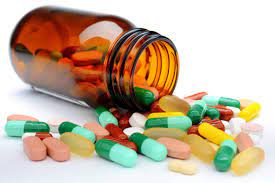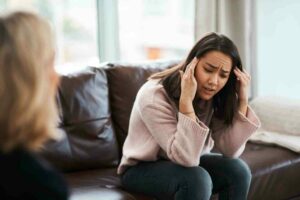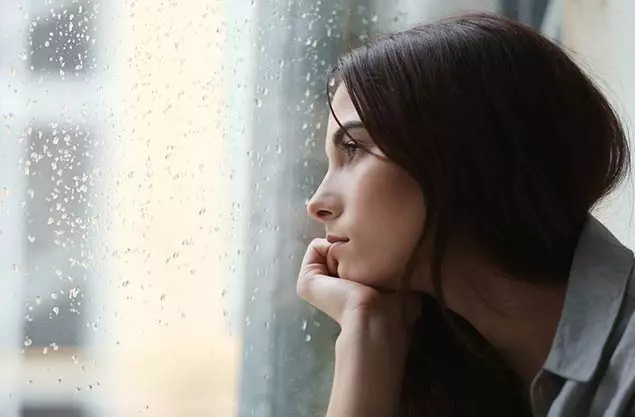Depression is a serious mental illness that can cause significant problems in people’s lives. It is estimated that around 1 in 4 people will experience depression at some point in their lives. While there are many different treatments for depression, the first line of treatment is usually medication. In this blog post, we will discuss the different types of first-line treatments for depression!
Contents
What Is The First Line Treatment For Depression?
 The first-line treatment for depression is defined as the initial treatment option for individuals who are experiencing depression. This usually involves psychotherapy, antidepressant medications, or a combination of both.
The first-line treatment for depression is defined as the initial treatment option for individuals who are experiencing depression. This usually involves psychotherapy, antidepressant medications, or a combination of both.
Psychotherapy is also known as talk therapy and it involves discussing emotions and feelings with a trained mental health professional. It helps people to recognize their own negative thought patterns that contribute to their depressive symptoms. As well as providing a supportive environment, psychotherapy also helps people to identify and address the underlying causes of their depression.
Antidepressant medications help to regulate levels of certain brain chemicals, such as serotonin and norepinephrine, which are known to be involved in regulating mood. Different types of antidepressants can be used depending on the individual’s symptoms and response.
No matter what the approach may be, it is important to consult a mental health professional for an accurate diagnosis before starting any treatment. With proper treatment and management, individuals can manage their depression symptoms and lead a healthy and fulfilling life.
What Are Some Types Of First Line Treatment For Depression?
There are several different types of first-line treatments for depression, such as psychotherapy, medications, lifestyle changes, and complementary therapies. Let’s discuss them briefly:
Psychotherapy
It is one of the most common treatments for depression. It involves talking to a trained mental health professional such as a psychologist or counselor about your thoughts and feelings. These sessions can help you better understand your condition, learn how to cope with difficult emotions, and improve communication skills.
Under this umbrella, there are several different types of psychotherapy including:
- Cognitive-behavioral therapy (CBT): This type of therapy focuses on identifying and changing problematic thought patterns that can lead to depression. It will also help you manage stress and anxiety.
- Interpersonal therapy (IPT): This is a short-term form of therapy that can help improve communication and problem-solving skills. It also helps you manage interpersonal relationships better.
- Dialectical behavior therapy (DBT): Another form of therapy, DBT teaches skills to help you better manage your emotions and improve relationships.
- Psychodynamic therapy: The most traditional type of psychotherapy, psychodynamic therapy encourages you to explore your innermost thoughts and feelings in order to gain insight into how they affect your behavior and your depression.
So, you can see the therapies are very helpful in treating depression. And the several types can be used in combination as well for best results. Be sure to talk to your doctor or therapist about which type is best for you.
Medications
 Your doctor may also prescribe medications to help relieve the symptoms of depression as a first-line treatment. These medications, such as Selective Serotonin Reuptake Inhibitors (SSRIs) and tricyclic antidepressants, work by blocking the reabsorption of certain neurotransmitters in your brain that can lead to depression.
Your doctor may also prescribe medications to help relieve the symptoms of depression as a first-line treatment. These medications, such as Selective Serotonin Reuptake Inhibitors (SSRIs) and tricyclic antidepressants, work by blocking the reabsorption of certain neurotransmitters in your brain that can lead to depression.
It’s important to remember that these medications may take several weeks before they start working, so patience is key. It’s also important to follow your doctor’s instructions closely and let them know if you experience any side effects while taking them.
However, several studies have found that a combination of psychotherapy and medication may be more effective than either one alone. So, your doctor will likely recommend both options for you.
Lifestyle Changes
As depression is highly interconnected with lifestyle, making changes to your daily schedule and habits can help improve symptoms. Some tips include:
- Regular exercise: Exercise helps release endorphins that can make you feel happier and more energized. Aim for at least 20-30 minutes of physical activity, like walking or swimming, several times a week.
- Healthy diet: Eating a balanced diet can help improve your mood and give you the energy you need to get through the day.
- Sleep hygiene: Making sure that you’re getting enough quality sleep is key for managing depression. Aim for 7-9 hours of sleep per night, avoid caffeine or alcohol late at night, and establish a regular bedtime routine.
- Stress management: Reducing stress can help improve your mood and overall mental health. Consider yoga, meditation, or deep breathing exercises to help you relax.
Complementary Therapies
In addition to the above treatments, there are also complementary therapies that can be used to supplement your treatment plan. Some examples include:
- Art therapy: This type of therapy uses creative expression as a way to help manage depression.
- Acupuncture: Studies have found that acupuncture can be helpful in treating depression, especially when used in combination with other treatments.
- Herbal remedies: Certain herbs, such as St. John’s Wort, may have mood-boosting properties and can be used to help treat depression.
- Music therapy: Research has found that listening to music can be beneficial for relieving stress and anxiety, which can help improve symptoms of depression.
- Aromatherapy: The scent of certain essential oils, like lavender or chamomile, can be helpful for reducing stress and improving mood.
No matter what treatment plan you choose, it’s important to remember that depression is a treatable condition. With the help of your doctor or therapist, you can find the right combination of treatments that work for you. There is hope, and you can start to feel better.
Which Is The Best First Line Treatment For Depression?
 If you are struggling with depression, it is important to find a treatment that works best for you. While there is no single “best” first-line treatment for depression, research has shown that the most effective treatments include some form of combination.
If you are struggling with depression, it is important to find a treatment that works best for you. While there is no single “best” first-line treatment for depression, research has shown that the most effective treatments include some form of combination.
However, here are some factors that may influence which first-line treatment for depression is best for you:
- The severity of your symptoms: Generally, the most severe cases of depression require a combination of treatments.
- The type of depression you have: Different types of depression—such as major depressive disorder (MDD), persistent depressive disorder (PDD), and bipolar disorder—require different kinds of treatments.
- Your access to healthcare: If you have limited access to mental health services, such as counseling or medication, it’s important to consider other options that may be available in your area.
- Your personal preferences: Some people prefer certain treatments over others, and it’s important to consider what works best for you and your lifestyle.
- Availability of support: Having the support of family and friends can be crucial in helping you stick to a treatment plan.
So, the best will depend on you and your individual needs. And do not forget to reach out to your doctor or mental health professional to discuss the best treatment plan for you. With a proper diagnosis and the right treatment, it is possible to manage symptoms of depression and live a healthy life.
Conclusion
In conclusion, first-line treatment for depression is important. It can be the difference between life and death. If you or someone you know is depressed, please seek help. There are many resources available, such as hotlines and therapy. Depression is a real illness with real consequences, but it is also treatable. Recovery is possible.
There are many different types of depression, so it’s important to seek professional help in order to find the best treatment for you. Don’t be ashamed of seeking help, it is the first step toward recovery.
For more information, please contact MantraCare. Depression is a mental illness characterized by persistent feelings of sadness, hopelessness, and loss of interest in daily activities. If you have any queries regarding Online Depression Counseling experienced therapists at MantraCare can help: Book a trial Depression Therapy session


